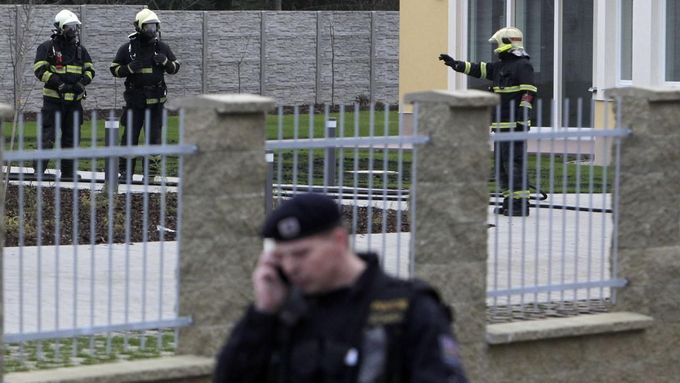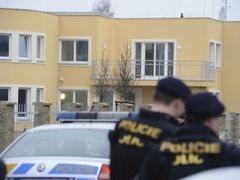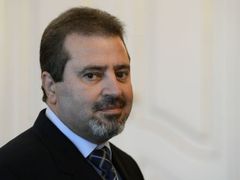Prague - The Czech capital may be a transit point in a European-wide arms-smuggling network operated from Palestine, said Czech General Jiri Sedivy, former Chief of General Staff, in an interview with Czech Internet newspaper Aktualne.cz on Saturday, January 4.
Czech media reported earlier this week that Czech police found as much as 70 unregistered assault rifles when conducting a search at the building of the future Palestinian embassy in Prague after the Palestinian ambassador to the Czech Republic was killed by in explosion on Wednesday, January 1.
On Sunday, January 5, Czech police president Martin Cervicek told iDnes, a Czech Internet newspaper, that 12 firearms had been found at the embassy, including pistols and assault rifles. In the next days, police will question people connected to the compound of the future Palestinian embassy, said police spokeswoman Andrea Zoulova.
The Palestinian deputy foreign minister told AP that the weapons were legal and had been stored at the embassy since the Czechoslovak communist era.
Arms shipments to Schengen Area?
"Palestinian diplomats should finally stop playing dumb and explain what did they have an arms deposit in Prague for. The unprecedented scandal is no longer about the Czech Republic, it already concerns other European countries and possibly also the international community, which is threatened by this kind of activities," said Sedivy.
"It scares me," said the general, adding that it was "very likely" that Palestinians had similar arms deposits also at other embassies in Europe. "Possibly, we are speaking about a well-organized distribution network for arms and explosives, with a wide-spread transfer of weapons to very specific recipients," said Sedivy.
Speaking on condition of anonymity, a Czech anti-terrorism cop pointed out the possibility that the Palestinian embassy in Prague served as a transit point to freely ship firearms to any of the 26 Schengen Area countries.
Illegal arms scandal
Czech police spokeswoman Andrea Zoulova confirmed the discovery of the firearms to Reuters on January 2.
The arsenal included assault rifles and was enough to arm a unit of ten men, reported initially Czech weekly newspaper Respekt, adding that the arms were moved into the country illegally. The newspaper pointed out though that the arms were not necessarily meant to carry out some kind of strike. "Palestinians are afraid of attacks from Israel's Mossad. All over the world they arm themselves, just in case, even though they violate diplomatic agreements," a counterintelligence officer told Respekt.
Police said they would conduct ballistic and DNA tests on the weapons in order to find out if they were registered somewhere and to explain how they got into the embassy.
Deadly blast
The blast took place at the new apartment of the Palestinian ambassador to the Czech Republic shortly before noon on January 1, 2014. The ambassador, Jamal Al Jamal, was seriously injured in the blast and died from his injuries in hospital several hours after the explosion.
The ambassador's residence is in a newly constructed compound that is planned to become the seat of the future Palestinian embassy in the Czech Republic. The late ambassador and his family moved to the new residence, situated in Internacionalni Street in the Suchdol neighborhood, a few days before the explosion.
Czech police almost immediately ruled out the possibility of a terrorist attack and said they believed that the blast took place when the ambassador tried to open an old safe protected by an explosive device. A high placed source confirmed to Aktualne.cz that terrorism was not involved.
Ambassador's daughter: "Not an accident"
On January 2, embassy spokesman Nabil El Fahel said that the safe in question was "in daily use", countering the claim made earlier by the Palestinian foreign minister who said that the safe had not been opened for over 20 years. Fahil said that the late ambassador had routinely put cash in the safe and that it wasn't protected by any explosive device. The safe had been moved into the residence from the old embassy building.
According to Fahel, the minister spoke about a different safe at the embassy compound. The spokesman said that he had no explanation for the blast and that he could not rule out that it was a deliberate attack.
Rana Al Jamal, the ambassador's daughter, told media that her father's death "was not an accident."
Anti-tank missile at Iraqi embassy in 2003
Karel Randak, former chief of the Czech foreign intelligence agency UZSI, says that most other Arab embassies in Prague store illegal arms too.
And at least one such case has already been reported. BIS, the Czech counter-intelligence and security agency, learned in 2003 that there was an anti-tank missile stored at the Iraq embassy in Prague. Czech police eventually forced the embassy to give up its entire arsenal, which consisted of 11 pistols, six machine guns equipped with silencers, 2,000 bullets, and an RPG-7. The missile was meant to be used to attack the Prague headquarters of Radio Free Europe, said BIS spokesman Jan Subert.
The Czech Republic eventually expelled several Iraqi diplomats, including the charge d'affaires.










